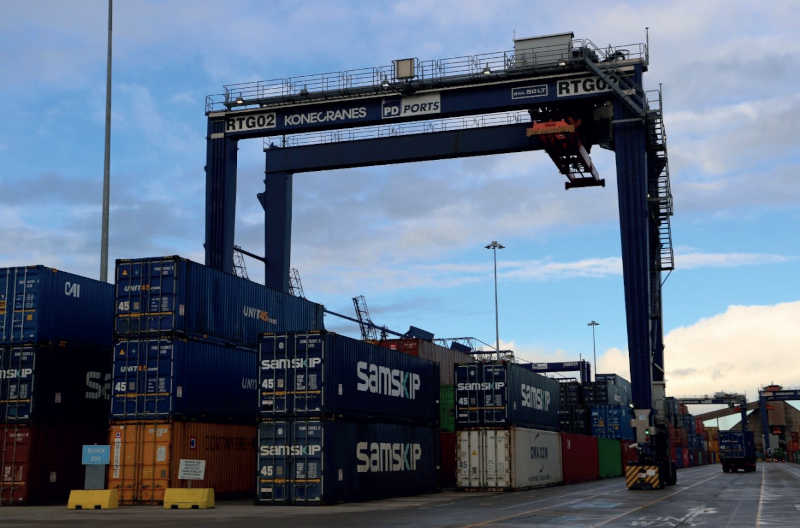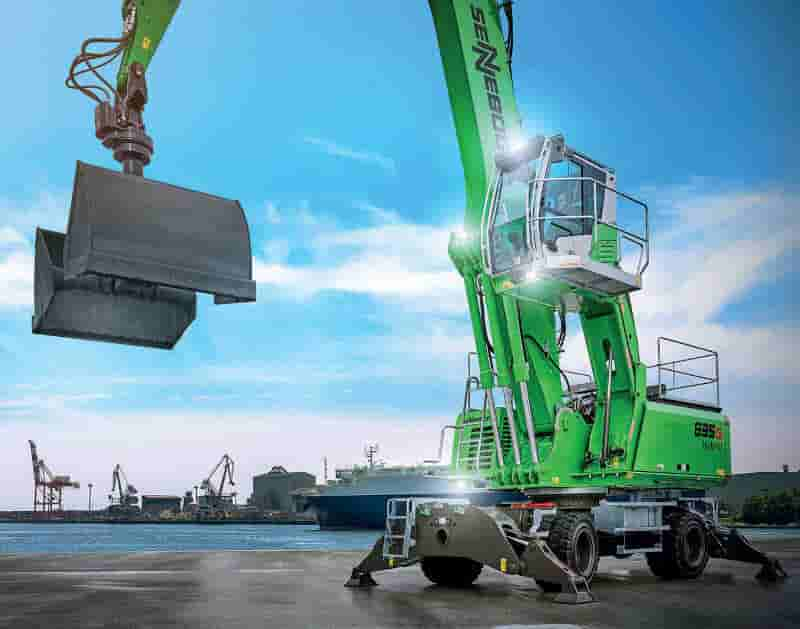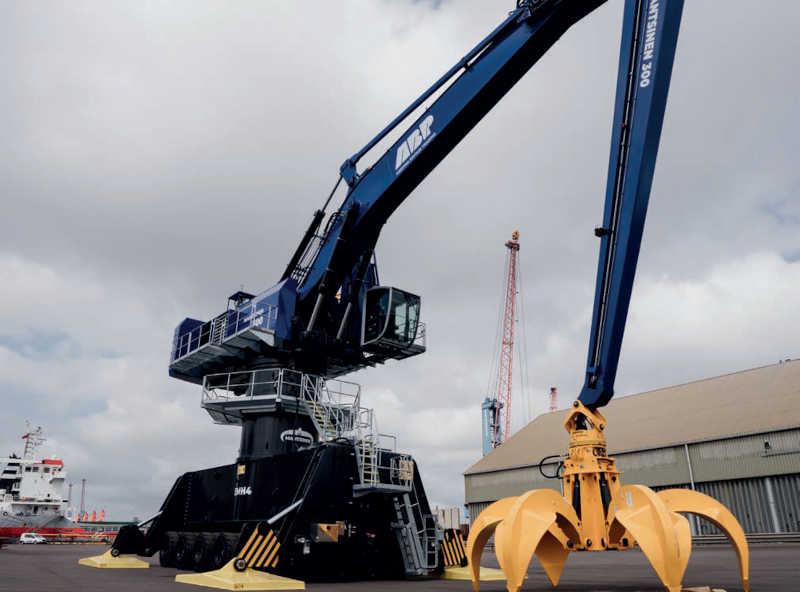Electrification and digital automation are going hand-in-hand. Julian champkin reports on ports’ progress.
Ports have traditionally been slow to automate, slow to digitize; as a global industry they lag well behind many other elements of global logistics and trade. Reasons are many, ranging from labour issues to the sheer technical complexity of having driverless container-carrying vehicles moving through obstacle-laden dock areas – that may contain people as well. But, over the past few years the pressures for efficiency, speed and growth, plus the increasing availability and power of digital solutions has pushed at that door; and the current supply-chain crisis has concentrated minds still further.
- Teesport’s RTGs are going electric
- The 835G hybrid from Sennebogen gives 30% energy savings
- The giant Mantsinen 300 crane newly-delivered to the port of Immingham
Climate change and the move away from diesel is another strong element. Together, electric drives and automation are moving hand-in-hand to transform port operations. And governments, all too keenly aware of the effect of supply chain problems on economies and on consumers (who of course are also voters) have been encouraging this.
In the US, more than $241 million in grants to U.S ports has been announced as part of the Biden administration’s near-term plan to address the clogged supply chain, nearly doubling next year to $450 million available annually for five years to improve port infrastructure.
In the UK, ports have also been availing themselves of government grants to modernise and automate.
Only a few years ago driverless RTGs and digital tracking of containers were radical innovations; today we are seeing global implementation of such developments, and any port that lacks them will be seen as lacking essential tools for the tasks of loading and unloading vessels. Logistics is too important to lag technology.
To put it simply, ports are going smart. A prime example in the UK is the east coast port of Felixstowe. In March this year, with grant funding from a £200 million ‘5G Testbeds and Trials’ programme by the Department for Digital, Culture, Media and Sport, it became the largest UK port to deploy 5G technology and the Internet of Things (IoT).
Owned by Hutchinson Ports, it along with consortium members, Three UK, Blue Mesh Solutions and the University of Cambridge was successful in an application for funding for a project that aims to prove the capabilities of 5G networks in a busy port environment.
The project seeks to deliver in two practical-use areas: predictive maintenance of quay cranes using IoT sensors and providing communications for remote controlled yard cranes.
Karen Poulter, head of Information Services for the Port of Felixstowe and 5G Project Lead, explains what is happening: “As part of the 5G project, six quay cranes are being fitted with IoT sensors to understand the stresses and strains placed on them by day-to-day operations. Using 5G to transmit the data enables these systems to operate in real time, which could enable ‘in the moment’ safety-critical applications.” Time-lags in such situations are clearly unacceptable, a 5G must be shown to be able to deliver near-instantaneously. “On predictive maintenance, taking the data generated by the IoT sensors and linking it to the actual activity on the crane together with previous maintenance records, Cambridge University is developing an algorithm to predict equipment failure and to suggest the optimum time to maintain the equipment.” It is called condition monitoring and it is not confined to Felixstowe or the UK.
“Condition monitoring, done through an interconnected network of cellular-connected sensors, helps collect and analyze data on the condition of equipment, including things like temperature and even vibration rate,” says Adam Schipper, director, Business Development, Transportation & Logistics, Ericsson North America – Ericsson make 5G systems for this purpose. “This can help predict future equipment failures as well as enabling quick resolution of malfunctions. When an anomaly is detected, processes can be shut down remotely or even automatically, and a worker dispatched to the site to resolve the problem. According to a report by Port Strategy, this can reduce on-the-ground monitoring by as much as 40%.”
The process really requires 5G to work well: “The 5G network can handle the huge volume of data collected, which will be used to train the algorithm at levels that wouldn’t be sustainable over 4G,” says Poulter.
Felixstowe already operates remote control quay cranes and yard cranes, but traditional methods of communicating to CCTV needed for remote control have limitations on bandwidth and flexibility for extension across the port.
5G and its low latency and high throughput capabilities make it the optimum technology to power remote control and automation.
“5G allows IoT systems to operate in a denser and more data rich environment,” says Richard Brooks, managing director, Blue Mesh Solutions. “Combining modern sensors with IoT technology to manage data backhaul allows data to be used in new ways, such as combining the sensors with Artificial Intelligence (AI) algorithms to search for inferences in data that are hidden from standard analysis methods.”
The project is due for completion in September 2022. As another element in automation Felixstowe has also ordered 17 Automated Rubber-Tyred Gantry cranes (ARTGs) from Konecranes.
These are the first Konecranes ARTGs to be delivered to the United Kingdom; it is also, to date, the largest order of Konecranes ARTGs for a single terminal or project anywhere.
They are fully-electric, and automated. Felixstowe’s eight existing ARTGs will be integrated with the new machines and with Konecranes’ Remote Operating Stations (ROS) as part of a single automated system.
A single operator at a Konecranes ROS will be able to remotely handle up to five ARTGs simultaneously across the yard.
The Konecranes’ “street bogie” solution will enable fully automated gantry travel, using proven safety technologies for obstacle detection.
From the crane-maker’s perspective this project with Felixstowe is an excellent example of Konecranes’ ‘path to port automation’ whereby container terminals can improve productivity and safety in manageable steps rather than by disruptive all-in-one change. Beginning with smart features and progressing to full automation, the path can include supervised operation and remote operation to smoothly introduce the power of automation. Konecranes has made available a company white paper on the subject, downloadable from the Konecranes website. Its conclusion is that while 4G does not offer the bandwidth that ports need to operate RTGs remotely and automatically, and even 5G will need development work, RTGs with automation can currently be operated reliably and safely using wireless MPLS (multi-protocol label switching) technology.
The flexibility which that offers makes it possible to operate even diesel-powered RTGs wirelessly, in small or in large fleets.
Meanwhile, a little north at the mouth of the river Tees, Teesport is going all-electric. It is the fifth-largest port in the UK (and, curiously, the only one to handle more exports than imports); operators PD Ports have contracted Konecranes to convert the primary power supply of four diesel-driven Rubber Tyred Gantry Cranes (RTGs) from diesel to electric. It is the first phase of a wider electrification process totalling over £2 million of investment and is a step in an ongoing journey of decarbonisation: the port operator aims to reach carbon-neutrality across the whole of its Tees-based operations by 2027.
The retrofit demonstrates the link between electrification and automation. Konecranes will be removing all the diesel components from the RTGs; at the same time they will be installing fibre optics into the machines. These will future-proof the RTGs, enabling continuous upgrades, and will give them access to enhanced features such as remote operations, meaning the equipment will increase both efficiency and productivity for PD Ports.
Each RTG will take an average of three weeks to covert, and the project will extend the lifespan of each one of them for an additional decade – which is yet another economic and environmental benefit, since a good way to reduce carbon footprint is to replace machinery less often. The project is due for completion in early 2022.
Meanwhile yet again on the east coast of England, an example of the world’s largest hydraulic crane has just been delivered to the port of Immingham. The Mantsinen 300M Hybrilift arrived in April from its factory in Finland in a £3 million investment by Associated British Ports (ABP). It is the first of its kind in the UK.
Launched in 2018, these are supersized boom-and-stick machines; they have the reach and capacity to serve panamax-size vessels and can handle as much as 1500 tons per hour – far greater than rope-crane equivalents.
They can be fitted with attachments for either container or bulk-handling. ABP have opted for an 18.5m curved boom and 14m stick; their machine has a wheeled six-axle undercarriage with four wheels per axle, which provides greater mobility especially on uneven ground. It weighs in at 365 tons.
The crane is diesel powered, by a stage V Volvo 16 litre diesel engine, but it does have energy-saving technology in the Hybrilift energy storage and recovery system, which increases energy efficiency by up to 50%. The cab is on a riser to give the operator a direct line of sight into the vessel’s hold.
Mantsinen also make all-electric-powered cranes, and AB Ports has ordered two of them. These are for the company’s also-east-coast port of Ipswich. The two model 95ER cranes have been configured to optimise efficiencies around the specific of the operations at Ipswich: they will be able to manage a range of material received in the port, which handles over two million tons of cargo each year and is the UK’s leading grain export port.
It is estimated that the two electric cranes will save up to 5,275 tons of CO2 emissions over their lifetime. Remarkably, they can be powered by solar energy generated at the port itself. The Port of Ipswich already has onsite solar energy generation, totalling 1.25MW across six buildings, and has invested in an onsite sub-station to future-proof sustainable portside operations to accommodate up to four electric powered cranes. The port has also invested in electric vans to minimise the impact of port operations on the environment.
The initiative improves ABP’s green credentials, reducing the port’s CO2 emissions and decreasing energy consumption by up to 40%, and will also allow for quieter operations and improved air quality.
Meanwhile, across the North Sea and into the Baltic, the port of Gdansk in Poland took delivery in March of a Liebherr LHM 550 mobile harbour crane.
The new machine will primarily be used for bulk handling of coke, coal and scrap metal. The LHM 550 is the bestseller in Liebherr’s mobile harbour crane portfolio and this is actually the 300th that Liebherr has delivered. For the operating company, Port Gdansk Eksploatacja, it is one of the largest investments in its 30-year history. The crane has a boom length of 48 metres and a lifting capacity of up to 104 tons.
Hybrid drives, of diesel and electric motors, have been available on Liebherr harbour cranes for more than 20 years but the cranes can also be used in electriconly operation for emission-free goods handling. Liebherr report that demand for harbour cranes with zero-emission e-drive has doubled since 2019. Over 30% of the LHM 550s sold in 2021 year were equipped with an electric main drive.
“It is noticeable that the demand for electric motors with power from the local electricity grid has increased enormously in the last two years,” says senior marketing manager, Philipp Helberg.
“Compared to 2019, the demand for LHM cranes with an e-drive has doubled. More than a third of all Liebherr mobile harbour crane orders have an e-drive installed – and the trend is rising. Retrofitting electric drives is also possible and is increasingly being used by mobile harbour crane customers.”
The electric power can come from a low-voltage network from 400 volts or a high-voltage network up to 20 kV. In the case of a high-voltage supply, this is converted into low voltage via a transformer mounted on the undercarriage, so that only low voltage is present in the crane itself,” says Helberg.
“We can offer the option of a cable-reeling drum for the safe movement of the crane with the cable. Cable lengths of between 70 metres and 200 metres can be accommodated, depending on the voltage present at the feed point.”
Port equipment manufacturers Kalmar are also going electric. The company introduced the first all-electric reachstackers to the market in December last year (2021). They want to show the industry that electrified reachstacker container handling is a now a practical and feasible solution; they are particularly proud that their revolution was designed during lock-down with the engineers mainly working from home. In January they contracted to supply the first machine to Westport AS, which operates the ports of Risavika outside Stavanger and Dokken in Bergen and is the leading port operator in western Norway.
Kalmar reachstackers are also pioneers in having a combined charging system: the 326kWh lithium-ion battery capacity is sufficient to cover a full working shift, with charging performed during scheduled breaks using CCS chargers with a maximum capacity of 350 kW, making it the world’s first reachstacker to implement this charging standard.
The model ordered by Westport has a maximum lifting capacity of 45 tons and is capable of stacking containers five high and three rows deep. The battery is covered by a five-year warranty and has an expected first life of 10–12 years.
The order, which includes a five-year service agreement, is scheduled for delivery in the fourth quarter of 2022. Westport’s investments in electrification, hybrid solutions and biodiesel will reduce their emissions by 56% in 2022 with a target of zero emissions by 2030.
Not all new machinery is all-electric, but even diesel units are exploiting energy recovery systems. Sennebogen, for example, introduced in 2021 its G series flagship material handler with the new 835 G Hybrid. (‘Hybrid’ here refers to having energy recovery systems, rather than being part-powered by electric motors. The crane is diesel powered.)
It is, they say, the first time its Green Hybrid energy recovery system is being used in the under 50 ton machine category. It works by using a third hydraulic cylinder on the boom, which is connected to a nitrogen gas accumulator, carried at the rear of the machine.
The system works as a spring, storing and releasing energy as the boom changes position and lowers or raises a load. The energy saving, say Sennebogen, is up to 30%. The 835G Hybrid is available in an electric version also, which reduces operating costs by up to 50%.
Sennebogen has also redesigned and given a major update to its 860E material handler, which has found worldwide use in ports. It now has a higher load capacity and improved performance, but perhaps especially relevant is that it now incorporates a range of energy-efficient measures, gained form the experience of many customer deployments, and is now tailored to the requirements of port handling.
It too has the hybrid energy recovery system; based on 4,000 annual operating hours the claim is that up to 40,000 litres of fuel can be saved per year. It has two particularly weight-optimised port sticks; the engineers have been able to increase the load capacities by around 10%, which means not just that it can lift heavier weights but that it can move more bulk and general cargo in each work shift. In the standard version, the operator’s cab can be elevated up to 2/7m, but optional large-capacity cabs and elevations up to 14m are available, giving clear views into the hold. And again an all-electric version is available, with a 250kW engine.
International shipping remains one of the largest users of diesel and emitters CO2, but the future for ports at least does seem to be at least almost all-electric
Cranes play an important role in the electrification and digitization of ports



没有评论:
发表评论